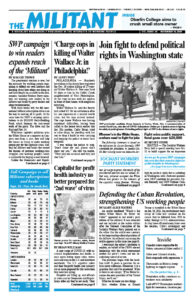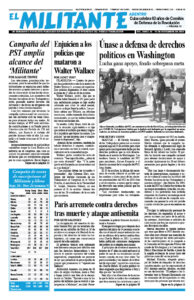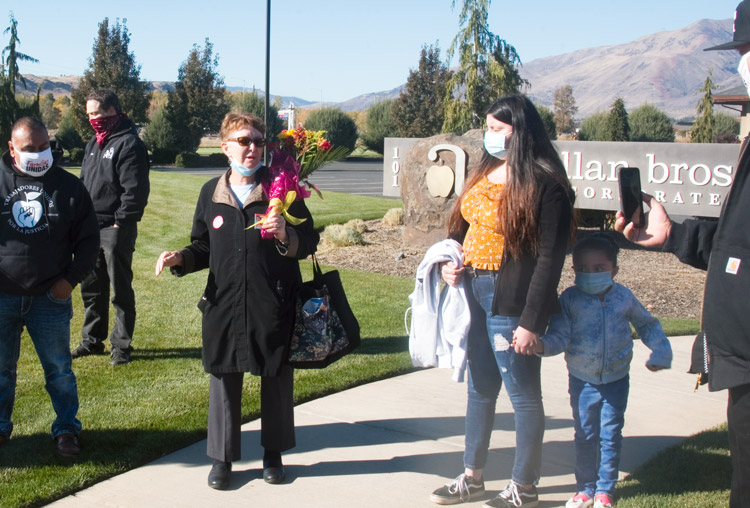AS WE GO TO PRESS the Socialist Workers Party received notice from its attorneys in Seattle that the first round in the fight to prevent the state from disclosing the names and addresses of its presidential electors has been won. The secretary of state’s office now says it will not release any information unless a new, unambiguous request to do so is filed. State officials continue to assert, however, that if they get such a request they will hand the information over unless the party gets a court order. The Militant will continue to fight to win support against this threat to political rights.
SEATTLE — The Socialist Workers Party held a special meeting here Oct. 30 to build support for an important fight for political rights that is unfolding in Washington state. Featured speakers were SWP candidate for president Alyson Kennedy and SWP National Campaign Director John Studer.
On Oct. 19 the secretary of state’s office informed the party that the names and addresses of the 2020 SWP presidential electors would be released publicly, unless the campaign got a court order barring them from doing so.
“The questions involved here are important for all working people,” said Seattle SWP leader Mary Martin, who chaired the meeting. “We have sought legal counsel to block this release and have launched a political fight against it.” The campaign has retained representation by Barnard Iglitzin and Lavitt, a well-known labor law firm in Seattle.
“There is a long, documented history of disruption, spying and acts of violence against the Socialist Workers Party’s campaigners and our offices,” Martin said. In 1984 the SWP headquarters in Seattle was firebombed. This year, threats to kill its candidates and their supporters have been made and a threat to burn down the party headquarters and kill everyone in it was left on the campaign office phone.
Making the electors’ personal information public would open them up to harassment and worse, from cops, bosses, rightists or middle-class radicals who increasingly seek to shut down those who they disagree with.
This important political rights fight was also discussed at Militant Labor Forums across the country, launching a national campaign to get statements of support for the Washington state fight and to rapidly raise the $20,000 needed for legal and other expenses. Over 30 people at the Seattle meeting contributed $2,891. Together with collections at the other forums $20,420 has been raised so far.
Martin described the multiyear political battle it took for the SWP to win exemption from having to turn over the names and personal information of campaign contributors to the Washington State Public Disclosure Commission and the Seattle Ethics and Elections Commission, despite extensive evidence of both government and private harassment.
‘Threat to First Amendment rights’
Michael Krinsky, senior attorney in the constitutional rights law firm that has represented the SWP for many decades, wrote in a statement: “The threat to First Amendment freedoms from the threatened disclosures is real, both to persons wishing to associate with the SWP and, by the precedent it would set, to many others wishing to associate with causes and organizations that may be the target of governmental or private hostility.”
Alyson Kennedy described the positive response the Socialist Workers Party campaign has received while she and running mate Malcolm Jarrett have campaigned in some 90 cities and towns, marching in protests, walking union picket lines and talking with workers on their doorsteps and at Walmart parking lots. (See Kennedy’s talk on front page.)
‘Utmost importance to workers’
Studer noted that not just the rights of the party were involved but political freedoms conquered by working people in blood.

“The communists — a small minority — must fight to be heard,” Socialist Workers Party National Secretary James P. Cannon wrote in the Militant in 1931. “Democratic rights are of the utmost importance to the workers in their struggle for organization.”
Studer reviewed the proud history of the party in defending free speech, political rights and victims of government and boss attacks. “It’s part and parcel of who we are, a party of workers, participating in the struggles of the working class and advancing a course toward ending capitalist exploitation,” he said. “That’s why the wrath of the ruling class comes down on us, going back to the founding of the communist movement in this country.”
He described how Cannon — as a leader of the Communist Party before being expelled by followers of Joseph Stalin who overturned the Bolsheviks’ revolutionary course — was instrumental in forming the International Labor Defense in 1925.
He met with Big Bill Haywood, a former Industrial Workers of the World leader, who had moved to Moscow after being convicted in a frame-up trial in Chicago and sentenced to 20 years in prison. “We worked out the plan and conception of the International Labor Defense as a nonpartisan body which would defend any member of the working class movement, regardless of his opinion or affiliation, if he came under persecution by capitalist law,” Cannon wrote in The First Ten Years of American Communism.
The attorney for Haywood and over 100 other IWW members in the Chicago trial was George Vanderveer, Studer said. Vanderveer was the founder of the law firm that is representing the SWP in Seattle today.
SWP members helped build and lead the Teamsters union in Minneapolis and across the Midwest in the 1930s, Studer said. For this, and for leading labor opposition to U.S. entry into the second imperialist world war, 18 Teamsters and SWP leaders were indicted and imprisoned in the 1940s.
In the 1960s and ’70s deep changes in social consciousness affected the working class as the fight against Jim Crow segregation, the war in Vietnam and for the development of the modern women’s liberation spread, he said. This created an opportunity for the party to launch a political campaign and court suit that helped expose decades of FBI spying and disruption against the party, the labor movement, and the fight for Black rights. “FBI spies amassed 10 million pages of files on the SWP alone,” Studer said.
The party won the lawsuit, dealing a blow to the U.S. rulers’ political police. They also won an additional court ruling that barred the FBI and other government agencies from having access to the names and files they had accumulated illegally.
In response to the spreading radicalization among working people, liberals at that time sought to clean up the image of the capitalist parties as rife with corruption and big-business control, by promoting “campaign finance reform.” The cornerstone of this attack on political rights was disclosure laws mandating the public release of names and addresses of those giving funds to political candidates, saying this would provide more “transparency.”
It was a fraud. It papered over the class reality that fundamental economic, political and military power is in the hands of the capitalists and that the ruling rich could always find ways around the laws, while working-class parties would have to submit to onerous red tape and face exposure of the names and addresses of their members and supporters.
This issue had arisen during the fight against Jim Crow segregation in the South in the 1950s, Studer said. The segregationist government in Alabama passed a law requiring the NAACP to turn over the names and addresses of all its members, which would have opened them to racist retaliation. The NAACP launched a campaign against the law and successfully got it overturned in federal court.
SWP wins fight against ‘disclosure’
Using this precedent, and the evidence exposed by the party’s lawsuit against FBI spying, the SWP won an exemption from turning over the names, addresses and workplaces of campaign contributors and its vendors, beginning in 1974, Studer said. The SWP was the only party ever to win exemption by the Federal Election Commission. But in 2017, the FEC voted to end the party’s exemption, claiming these attacks were mostly a thing of the past.
“The fight in Washington state is an important contribution to winning political space for the working class to debate, organize and fight,” Studer said. “It helps expose all the disclosure laws for what they are, an attack on the political rights of working people. It also helps lay the groundwork for a fight to win back the exemption from the federal disclosure law that the SWP lost three years ago.”
More statements of support are coming in. Call to Action on Puerto Rico in New York condemned the decision of the Washington state government to release the names and addresses of the SWP electors. “Defenders of Puerto Rico’s inalienable right to national sovereignty and independence know only too well how the government uses personal information to harass, intimidate and even threaten the lives of social justice activists,” they wrote Oct. 31.
Send statements to swpseattle@gmail.com.


